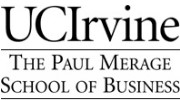My group's first paper was handed in this past Tuesday and we had all of two days to prepare a 20 minute presentation of our findings to our class. As I mentioned before, each group will have two major presentations to do before this quarter ends. In order to encourage every student to develop their presentation skills, The Merage School has mandated that every member in the group must present in at least one of the presentations. Myself and my teammate Andrew volunteered for the first one that we presented yesterday.
Presentation skills are important because managers inevitably will have to sell their ideas to senior management, customers or suppliers. One of the biggest complaints from corporate recruiters is that while MBA students have knowledge, they are very weak in conveying that knowledge and winning over key stakeholders. Studies have shown that our understandings are formed 55% from visual communication (body language, look of presentation slides), 38% from audio communication (what we say) and 7% from written communications. The implications of this conclusion is grave for people like me who are not natural presenters. It means that the written words that I carefully shape on my presentation slides will have little affect on our audience; they will form their understandings of my topic from the look of the slides and my body language in the delivery (that is the sound of my stomach sinking). This is where presentation skills are critical.
This brings me to really great little program that Merage has set up in order to help its students develop these presentation skills. Merage has retained the services of a presentation consultant, Mike Cannon, who has worked with people in all professions including some notable politicians. During Orientation Week, Mike delivers a two day seminar to all incoming students; the first day deals with oral presentations and the second day deals with written presentations. This gives each student a foundation in the theory of how to improve our presentations.
In our first quarter, each small group must make a major presentation. Mike helps each team prepare for the presentation by meeting with them for one hour reviewing the slides and oral presentation. This session was immensely valuable because it taught us how to put the theory into practice and cemented in our minds what it takes for a great presentation. Mike videotapes the actual presentation and gives each presenter detailed feedback. In our second quarter, as I mentioned, we have two presentations and each team member must present once. We don't get the opportunity to meet with Mike beforehand (he is fairly accessible via email), but we get the opportunity to show him how much knowledge we retained because he, again, videotapes each presentation and provides detailed feedback to each presenter.
Now, Mike definitely has a more "outgoing" style than many of our professors. He really pushes you to be dramatic because he feels that most of us will instinctively pull back of the performance whether we plan to be our normal selves or dramatic. Therefore, by shooting for dramatic we will just appear passionate; if we started at normal we would pull back to reserved. With that in mind, Mike gets you screaming your lines at the top of your lungs like a wild madman before you present in order to ensure your voice will project to the entire audience during the presentation (It really works, but it is hard to find a suitable place to practice before the presentation). In the end, for all the dramatic preparation we do, the final product just looks like we believe and are excited in our topic. As I mentioned above, that is 55% of communication.
The end result? Well, I still had some fumbles and stammers as I presented, but I really went for it and felt that I have dramatically improved my presentation skills. While scared silly, I actually want to get back out there and work on them some more?!?! Our power point slides were great. It amazing the jump in positive feedback one gets when he simplifies the text, makes the slides visually appealling (as opposed to informative), and places more focus on the recommendations or solutions and less on the build up of the story. I think back to the presentations I did as a lawyer or for a client company and I want the opportunity to do them again. I think of one of my first sales presentations that I had to lead where I prepared a 40 slide deck that told a wonderful story, but really did not put the focus on our solution (in my defense, I built the deck from the companies standard presentation). There I was in front of key decision makers and I did not maximize the opportunity.
In my opinion, the skills that The Merage School has Mike teaching us are almost worth the price of tuition. If you think that a high level sales person may do 2 presentations a month before key decision makers. That's 24 per year. And let's say from those 24, he wins 5 contracts each worth $1M . If he improves his presentation skills a little bit to win 2 addition contracts, in one year he probably has made the company enough profit and himself enough commission to pay for the tuition of our MBA program. The point is that even if effective presentation skills improve your success rate by a small amount, it has the potential to have a dramatic impact on your life. Remember communication is 55% visual and only 7% written.
Friday, March 09, 2007
Subscribe to:
Post Comments (Atom)


No comments:
Post a Comment